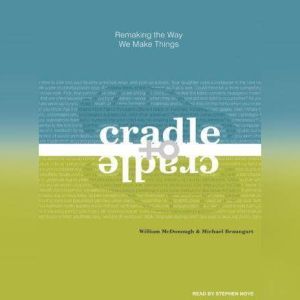

Cradle to Cradle
Remaking the Way We Make Things
Author: William McDonough, Michael Braungart
Narrator: Stephen Hoye
Unabridged: 5 hr 19 min
Format: Digital Audiobook Download
Publisher: Tantor Media
Published: 08/11/2008
Categories: Nonfiction, Nature, Ecology
Synopsis
In fact, why not take nature itself as our model? A tree produces thousands of blossoms in order to create another tree, yet we do not consider its abundance wasteful but safe, beautiful, and highly effective; hence, "waste equals food" is the first principle the book sets forth. Products might be designed so that, after their useful life, they provide nourishment for something new—either as "biological nutrients" that safely re-enter the environment or as "technical nutrients" that circulate within closed-loop industrial cycles without being "downcycled" into low-grade uses (as most "recyclables" now are).
Elaborating their principles from experience redesigning everything from carpeting to corporate campuses, the authors make an exciting and viable case for change.


